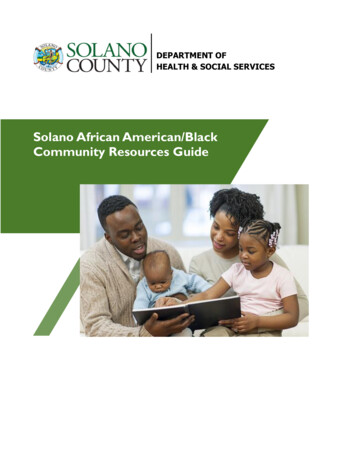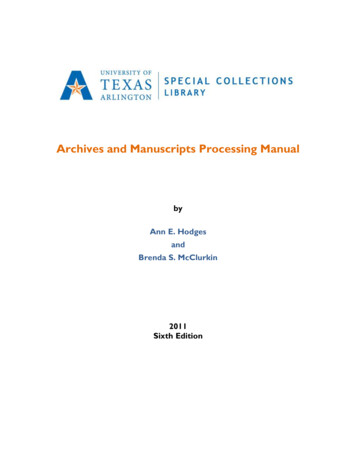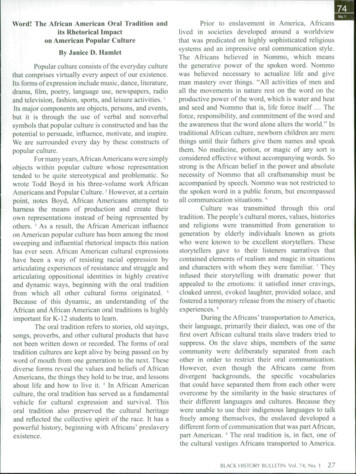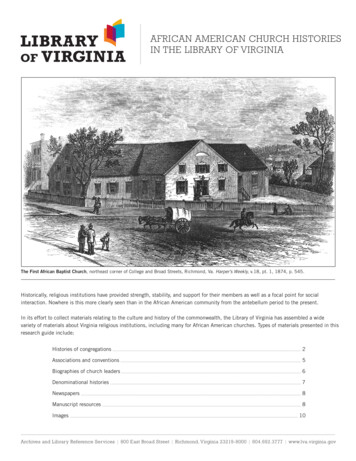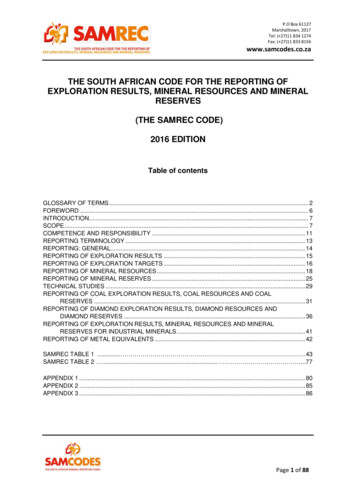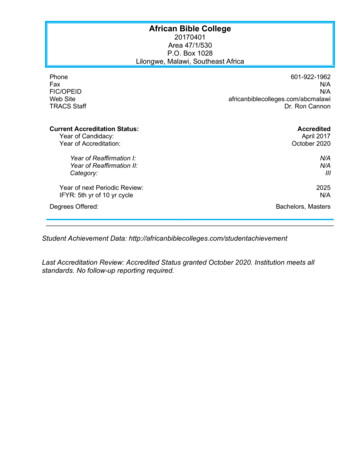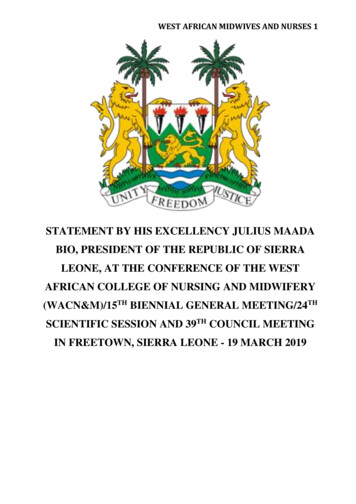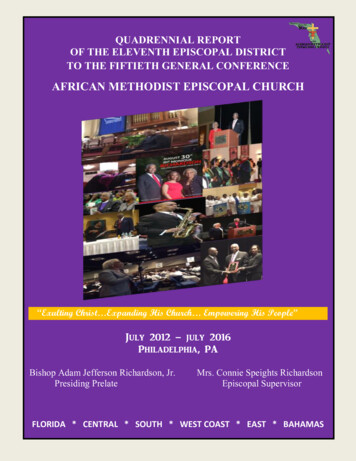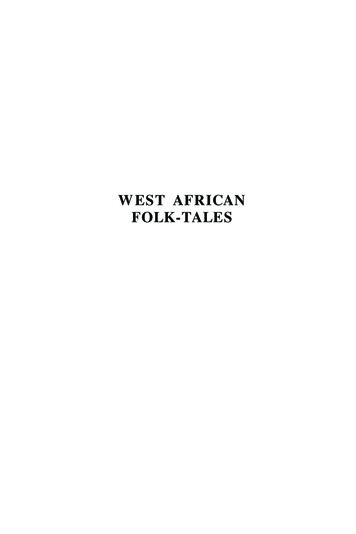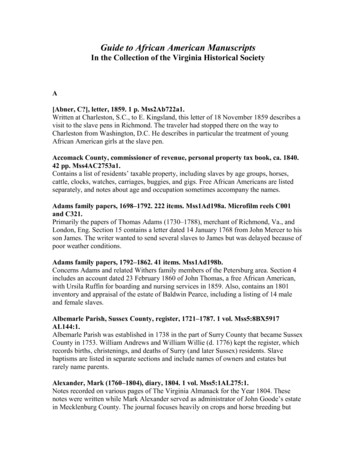
Transcription
Guide to African American ManuscriptsIn the Collection of the Virginia Historical SocietyA[Abner, C?], letter, 1859. 1 p. Mss2Ab722a1.Written at Charleston, S.C., to E. Kingsland, this letter of 18 November 1859 describes avisit to the slave pens in Richmond. The traveler had stopped there on the way toCharleston from Washington, D.C. He describes in particular the treatment of youngAfrican American girls at the slave pen.Accomack County, commissioner of revenue, personal property tax book, ca. 1840.42 pp. Mss4AC2753a1.Contains a list of residents’ taxable property, including slaves by age groups, horses,cattle, clocks, watches, carriages, buggies, and gigs. Free African Americans are listedseparately, and notes about age and occupation sometimes accompany the names.Adams family papers, 1698–1792. 222 items. Mss1Ad198a. Microfilm reels C001and C321.Primarily the papers of Thomas Adams (1730–1788), merchant of Richmond, Va., andLondon, Eng. Section 15 contains a letter dated 14 January 1768 from John Mercer to hisson James. The writer wanted to send several slaves to James but was delayed because ofpoor weather conditions.Adams family papers, 1792–1862. 41 items. Mss1Ad198b.Concerns Adams and related Withers family members of the Petersburg area. Section 4includes an account dated 23 February 1860 of John Thomas, a free African American,with Ursila Ruffin for boarding and nursing services in 1859. Also, contains an 1801inventory and appraisal of the estate of Baldwin Pearce, including a listing of 14 maleand female slaves.Albemarle Parish, Sussex County, register, 1721–1787. 1 vol. Mss5:8BX5917AL144:1.Albemarle Parish was established in 1738 in the part of Surry County that became SussexCounty in 1753. William Andrews and William Willie (d. 1776) kept the register, whichrecords births, christenings, and deaths of Surry (and later Sussex) residents. Slavebaptisms are listed in separate sections and include names of owners and estates butrarely name parents.Alexander, Mark (1760–1804), diary, 1804. 1 vol. Mss5:1AL275:1.Notes recorded on various pages of The Virginia Almanack for the Year 1804. Thesenotes were written while Mark Alexander served as administrator of John Goode’s estatein Mecklenburg County. The journal focuses heavily on crops and horse breeding but
2also includes a few brief notes on births, deaths, and escapes in which some slaves arementioned by name.Allen, John James (1797–1871), papers, 1820–1851. 19 items. Mss2AL5375b.Photocopies.Papers of a member of the Virginia Court of Appeals. Letter of 29 October 1829 waswritten in Richmond by Judge Edwin Steele Duncan, Allen’s half-brother, while heattended the state constitutional convention. The chief issues being debated were suffrageand the role of slavery in determining the franchise; Duncan asks for ideas andcommentary on those issues. Originals in private hands in 1989.Allen family papers, 1850–1910. 106 items. Mss1AL546a. Microfilm reel B1.This collection consists chiefly of the papers of Robert Henderson Allen (1817–1900),including a wide range of materials, such as accounts, correspondence, diaries, executionand judgment books, minutes, and business and legal agreements. The papers reflect theactivities of this Lunenburg County planter with interests in his plantation, his school,and his tobacco business, with frequent references to his participation in local politics andactivities as a justice of the peace.The diaries, 1858–1895, describe farm management with references ranging fromweather to labor. December and January entries through 1865 record prices from theannual hiring out proceedings. He also records births, deaths, and illnesses of slaves atOral Oaks and the number of slaves and days involved in building a slave house with achimney in November 1858. Numerous springtime entries concern heavy rains andwhooping cough with related illnesses, usually requiring the care of a doctor. Pages 212–213 list his account with Jonathan Ragsdale, a free African American who lateraccompanied Allen’s son to war. A brief eulogy for his old nurse Ginny and descriptionof her funeral constitutes a January 1861 entry. Entries around election times, beginningwith October 1867, record his comments on African American voting, RadicalRepublicans, and Virginia’s failing agricultural economy, which he attributes to a lessenergetic work force. Entries in 1865 and 1866 indicate that Allen was an agent for theFreedmen’s Bureau but tell little more about the agency.Execution and judgment books, 1883–1900, survive in the collection (items a14 and a15);the earlier volume contains a few notations on African Americans near the beginning ofthe book.Allen family papers, 1829–1918. 744 items. Mss1AL546c. Microfilm reels C447–448.The papers of the Allen family contain a wide range of material concerning themanagement of a Buckingham County plantation. They include land records,administrator’s accounts, contracts, and correspondence.Although plantation life is reflected through the whole collection, details of AfricanAmerican life appear in a letter to John Allen from Esie Jones, a freedman, asking to renta shop from Allen (section 9); a list of freedmen’s accounts with Samuel Allen beginningin 1865, for items such as shoes, clothing, and meat (section 15); contracts and leases
3with freedmen for farming land in Buckingham County (sections 16 and 23; fourteenfreedmen listed by full name); and an account book also containing tenant farmers’accounts (section 39).Allmand family papers, 1796–1891. 573 items. Mss1AL566a. Microfilm reels C558–559.The papers of the Allmand family of Norfolk concern several generations of familymembers with substantial shipping interests. The papers include accounts, deeds,correspondence, contracts, and court records. The bulk of the documents relate tocontracts with the U.S. Navy for shipbuilding materials.Among the papers of John Driver Allmand (1799–1851) is a letter to William H.Allmand (section 6) describing the 1846 capture of a slave ship by the USS Yorktownand return of the slaves to Africa. Also, among the papers of John Driver Allmand is acertificate of manumission, 1825, for Thomas, a young slave, and a receipt for 180 fromthe boy’s grandmother, Phoebe Spencer (section 8).Allyne, Samuel, receipt, 1746. 1 p. Mss2AL595al.Receipt, 13 February 1745/6, issued to Thomas March in Boston, Mass., for sale of aslave, Crown.Alston, John J., letter, 1825. 1 p. Mss2AL785al.Letter of 25 October 1825 written while at Chatham, Pittsylvania County, to Asa Dupuyof Prince Edward County, concerning the availability of slaves for sale.Ambler, Philip Barbour (1834–1902), scrapbook, 1860–1911. 142 pp.Mss5:7Am165:1.Volume includes obituaries of family members, Civil War reminiscences and articles,and information on Hollins Institute, Hollins, Va., where Ambler served as an instructor.Enclosed with the volume is an article concerning Elijah Jones, formerly a slave ofJaquelin Ambler.Ambler family (of Jamestown, Richmond, Williamsburg, and Amherst County),papers, 1638–1910. 142 items. Mss1Am167b. Photocopies.Collection includes a deed, 13 February 1744/45, of William Broadnax of Prince GeorgeCounty to Christopher Perkins of James City County for the slave William Liverpool.Ambler family (of Jamestown, Richmond, Williamsburg, and Amherst County),papers, 1772–1852. 159 items. Mss1Am167c.John Ambler (1762–1830) was a lawyer, planter, and lieutenant colonel in the Virginiamilitia. His correspondence (section 3) includes varied references to slaves, in particular,in letters from Samuel Coleman of Richmond (military orders to prevent an illegalassemblage of slaves), Rawleigh Colston (about a deed of trust concerning slaves), JamesSemple (discussing a dispute over the hiring out of four slaves), Littleton WallerTazewell (about a deed of trust concerning slaves), and Spencer Watkins (describing anoccurrence of measles and mumps among slaves on an Amherst County plantation). John
4Ambler’s legal papers include a conveyance (section 5) of land and eleven slaves toEdward and Thomas Ambler for the benefit of the children of Mary C. Smith, daughter ofJohn Ambler; an affidavit (section 6) of Charles McCook concerning two escaped slaves;and an affidavit of Charles Parke Goodall (section 7) stating that the escaped slave Sambelonged to John Ambler. John Ambler’s estate papers, 1837 (also section 7), include alist of slaves at Westham in Henrico County, which provides the slaves’ ages and values.Papers from the estate of Catherine C. (Ambler) Moncure, wife of Henry W. Moncure,include a list of slaves at Mill Farm in Louisa County, also with ages and values.American Colonization Society, Recording Secretary, letter, 1851. [2] p.Mss4Am353a4.A letter, 1851 May 8, of J. W. Lugenbeel, as recording secretary of the AmericanColonization Society, apparently in response to a letter from William J. Winston ofLouisa County concerning the cost and methods of sending freed slaves to Liberia. Thismatter is presumably in reference to settlement of the estate of William S. Winston.American Colonization Society, Richmond and Manchester Auxiliary, check, 1825.1 p. Mss4Am353a3.Check dated 29 January 1825 issued to William McKinney for 300 for an unidentifiedexpense.American Colonization Society, Richmond and Manchester Auxiliary, notice, 1824.1 p. Mss4Am353a2.Notice dated 12 January 1824 announcing a meeting of the managers of the Auxiliary tobe held in the clerk’s office of the Virginia House of Delegates.American Colonization Society, Virginia Branch, records, 1823–1859. 2 vols.Mss3Am353a. Microfilm reel C321.A minute book covers the period 1823–1859. (The Society became independent from thenational organization in 1828 and thereafter was known as the Virginia ColonizationSociety.) The book includes information on the debate over sending freed slaves to Haitior to West Africa, philosophy and benefits of emigration, the social status of free blacks,farming, health and education in the new colony of Liberia, establishment of the Liberiangovernment and military organization, slave trade, abolitionists, costs of emigration,special requests for sermons in support of colonization, and the social and politicalnecessity of colonization. An account book records donations and subscriptions of bothprivate individuals and churches, salaries and travel expenses for the society’s agents anddelegates, publication costs, and general emigration expenses.American Colonization Society, Virginia Branch, list, 1831. 1 p. Mss4Am353a1.List of emigrants, formerly the property of Thomas Pretlow of Southampton County,bound for Liberia.
5American Life Insurance Trust Company, Philadelphia, Pa., policy, 1860. 1 p.Mss2M9894a1.Policy issued 16 March 1860 to Caroline Myers on the life of Mary, a slave.Anderson, Archer (1838–1918), papers, 1852–1911. 51 items. Mss1An233a.Papers of a Richmond businessman primarily concerning Virginia and nationalDemocratic party politics and race relations. Section three contains materials compiled byAnderson concerning incidents of racial violence throughout Virginia during the stateelection campaign of 1883 and charges of voter intimidation made by General WilliamMahone. Correspondence of Anderson, George Douglas Wise, and William WashingtonBaker in this section include letters of William F. Drinkard (enclosing a printed letter ofIsaac Hill Christian concerning an incident at Charles City Court House), Charles TriplettO’Ferrall (concerning the shooting of a black man in Staunton), and Joseph Stebbins(enclosing a broadside "To the People of Halifax [County]"). Some of these letters, alongwith speeches and notes of Anderson, also contain references to riots at Danville andSouth Boston.Andrews, Charles Wesley (1807–1875), correspondence, 1847–1855. 9 items.Mss2An263b.Letters from Daniel Nelson, John Page, Peter Page, Robert M. Page, Solomon S. Page,and Peggue Potter, former slaves colonizing Liberia. Primary topics are health, education,and religion of the colonists; farming and blacksmithing; and trade, local government, themilitary, and politics. The colonists send specific requests for tools, building supplies, drygoods, books, and information about personal birthdates. The full text of the nine lettershas been printed in the Virginia Magazine of History and Biography 59 (1951): 72–88.Archer family papers, 1771–1919. 265 items. Mss1Ar247a.The collection includes accounts, land records, and correspondence, primarily of RichardThompson Archer (1797–1867), a plantation owner of Amelia County and later ofClaiborne County, Miss. The papers reflect the routine management and business ofplantations, from household accounts, children’s education, general family health, andnews to agricultural improvements.Items of particular interest include a sale document concerning Bob (section 7), severalaccounts for advertising, medical care, clothing, and taxes (section 9), a will listingfourteen slaves on a Mississippi plantation, most by first name (section 11), a letter fromRichard Archer to his wife, Ann, describing a typhoid outbreak and overcrowding amongthe slaves, a broadside providing political views on the Missouri Compromise, states’rights, and rejection of Texas’s application to the Union, a letter to James Hobsonconcerning the slave Billy (section 13), an 1882 letter describing spread of whoopingcough among African American children (section 20), and a list of seventy slaves of JaneSegar Archer (first names only, no date, section 21).Armistead, Robert Augustus (1808–1891), papers, 1848–1888. 151 items.Mss1Ar552a.This collection consists mostly of sermons written by the Reverend Robert Augustus
6Armistead, a Methodist minister who also served as a justice of the peace in ElizabethCity County. Section 3 contains an execution book kept while serving as justice of thepeace, 1852–1861, which makes references to slaves. Section 4 includes a summons forCharles, a slave belonging to Mrs. L. Garrett, for the theft of corn.Armistead, William Harrison (1820–1895), letter, 1839. 2 pp. Mss2Ar558a1.Letter, 8 December 1839, written while at the University of Virginia to Philip Howertonof Halifax Court House requesting money and arranging the purchase of clothing forslaves.Armistead-Blanton-Wallace family papers, 1827–1919. 96 items. Mss1Ar554b.This collection covers a wide range of materials from correspondence and accounts tooaths, diaries, and scrapbooks, involving an equally wide range of topics—farmingpractices, urban life during the antebellum period and the war years, army life, andforeign travel. The diary excerpts, 1842–1853, of Frances (Scott) Miller (section 10)describe the management of a boardinghouse in the college town of Hampden-Sydney,and several entries reveal her expectations of her slaves and their performance of theduties required of them.Armistead-Blanton-Wallace family papers, 1822–1939. 118 items. Mss1Ar554c.A second group of Armistead-Blanton-Wallace papers also contains materials on avariety of topics. Among the financial and legal papers of Howson Hooe Wallace (1799–1844) is a bill of sale for a slave (section 6).Armistead and Blanton family papers, 1856–1900. 155 items. Mss1Ar554d.Concerns family members in Cumberland County. Section 1 contains a letter dated 10August 1868 from Gustavus Ober to Jesse Scott Armistead (1797–1869) concerningAfrican American labor problems in Virginia and Maryland, which he attributes to anunsettled state of affairs resulting from emancipation. Section 3 (item d15) consists of abond for 70 of Jesse Armistead with Archibald Bolling dated 28 December 1866 tobenefit three named freedmen: Isham Skipwith, Samuel Bolling, and Randolph Miles.Armstrong, Sally, diary, 1863. 14 pp. Mss5:1Ar585:1. Copy.Concerns her activities at Rose Hill in Culpeper County, with references to theConfederate Army of Northern Virginia and the Union Army of the Potomac. Entries for16 and 17 August report on several slaves who had run away.Arnold, John, (b. 1782?), papers, 1812–1831. 4 items. Mss2Ar646b.Collection consists of deeds for slaves belonging to this resident of King George County.Arter, A. R., letter, 1864. 8 pp. Mss2Ar755a1. Photocopy.Letter, 23 June 1864, written at Wilson’s Landing, Charles City County, by a Unionsoldier concerning his observations of the war’s effects on southern planters and theirslaves and general views concerning African Americans from a northern perspective.
7Atkins, James T., compiler, papers, 1864–1928. 56 items. Mss1At527a. Photocopies.Materials collected while researching the life of Adam Boykin (1842–1927) of SurryCounty, who served in Company H of the 37th United States Colored Infantry during theCivil War. Boykin, also known as Adam Barkins, was born a slave in Isle of WightCounty and after his service in the war settled in Surry. The collection includes a roughdraft of a biography by Atkins; copies of a portrait; service records; affidavits regardingBoykins’s three marriages in Surry County; record of a land purchase; pension records;and a death certificate (all section 1). Also include applications and correspondenceregarding pension claims of the widow of Adam Boykin, Eva Crocker (Brown) Boykin(section 2), and research materials concerning the 37th Colored Infantry and AfricanAmerican troops from Lower Tidewater Virginia in the Civil War (section 3).Austin, John, receipt book, 1847–1849. 31 leaves. Mss5:3Au7623:1.Kept by Austin as a constable of Buckingham County, this volume contains records ofthe collection of debts, interest, and fees from judgments rendered by local justices of thepeace. It also bears the draft of a letter to an unidentified physician by M. E. Twymanconcerning medical treatment for a slave named Sammy.Avary, Myrta Lockett (1857–1946), papers, 1895–1941. 117 items. Mss1Av164a.Author of Dixie After the War (1906). One folder in this collection containsautobiographical notes of Harwood Alexander Lockett (b. 1812), especially concerninghis boyhood in Mecklenburg and Lunenburg counties. A significant portion of the textdescribes relations between slaves and their masters in the antebellum period.Aylett, Philip (1791–1848), list, [1831?]. 1 p. Mss2Ay444b5.List of real and personal property assigned to Mrs. Annah H. Moore by Thomas Moore’sestate in King William County, including names and values of slaves.Aylett family papers, 1776–1945. 2,848 items. Mss1Ay455a.Most of this collection comprises papers of William Roane Aylett (1833–1900), aprominent lawyer, planter, and politician in King William County.The earliest part of the collection contains an account book of Philip Aylett (1767–1831)with entries (on lines 13, 18, and 19) for amounts paid for the sale and hiring of slaves.Additional accounts concern Sam Mann, a free African American (page 2), and recordsof tenants’ accounts (page 43). Records of the estate of Philip Aylett (d. 1831) list sixtysix slaves and eight children, with values (section 5). Another list names six slaves hiredout in 1832 and records prices (section 6). Correspondence of Judith Page Waller Aylett(1804–1860) includes a letter from an acquaintance about her suspicions of Mrs. Aylett’sslaves and the theft of a neighbor’s chickens (section 12).The collection contains six boxes of letters written to William Roane Aylett. A samplingof one box indicates the truly diverse nature of the correspondence, which containsnumerous opinions about the conduct of slaves and freedmen and reports specificincidents. For example, Charles Beakeley (1857) could not move to Virginia because hisslaves had intermarried with his neighbors’ bondspeople; William Braxton (1859) refers
8to an annual agreement to hire his aunt’s slaves; W. F. Brockenbrough (1860) commentsthat the division and hiring of slaves from Bellevue had to be done at an unusual time;Jesse Butter (1856) addresses the request to have the slave Henry work on a house andthe propriety of having a slave sleep in the same house as his family; Samuel Compton(1852) relates a conversation he had with an African American woman while on astagecoach; Charles Cook (1871) offers views on removing African Americans fromVirginia.Other materials include two speeches, 1851–1865, one stating Aylett’s views on thepresence of free African Americans in a slaveholding community and calling for theirremoval, another conveying his opinion that the institution of slavery is advantageous tothe South (section 27). A scrapbook kept in The Globe Almanac for 1868 (prefaced byhis personal views) contains newspaper clippings about the entry of freedmen into thepolitical arena; the almanac also records statistics on state conventions for that year(section 36). An affidavit, 1863, deals with the valuation and execution of Richard, slaveof William R. Aylett (section 40). More legal material is contained in section 52, inparticular material concerning a King William County case of Commonwealth v. Martha,a cook accused of lacing food with ground glass. Correspondence of Alice Aylettincludes a letter from Emily Ann, 1863, describing community reaction to a slave’sattack on a local man. In 1864 she discusses arrangements for hiring a free AfricanAmerican woman (section 70). A pass, 1862, authorizes John, property of Alice Aylett, togo to Richmond (section 71). Several incomplete bonds for hiring out slaves to NormanSampson are dated 1859; two concern Betsey (section 75).NOTE: This collection holds several large series of correspondence that contain briefreferences to African Americans. No attempt has been made to index all of thosereferences.BBackus family papers, 1757–1807. 7 items. Mss2B1286b. Photocopies.Include advertisements, indentures, and receipts concerning the purchase and sale ofslaves belonging to Backus family members in Norwich, Conn.Bagby, George William (1828–1883), papers, 1828–1917. 1,648 items. Mss1B1463a.This collection includes business accounts for several newspapers with which Bagby, aRichmond resident, was affiliated, as well as notes and correspondence compiled ingathering material for his writings and lectures. He produced popular material onantebellum social life.Of special interest are Bagby’s research notes on The Old Virginia Negro. Section 1includes a response from William Roane Aylett for information. It discusses Aylett’sviews of African Americans in general, as well as offering anecdotes concerning alcohol,childbirth, religion, and conjuring. Notes for Bagbys speech, The Old Virginia Negro,and a scrapbook of newspaper clippings concerning African Americans, the CentralLunatic Asylum, a contemporary list of African American associations in Richmond,
9mortality rates, religion, anecdotes of life in antebellum Virginia, and a summary ofhypotheses on the future of African Americans in the South make up section 15. Abroadside advertisement for The Old Virginia Negro is included in section 18. A copy ofThomas Jefferson’s letter, 1805, to William Armistead Burwell relates Jefferson’s viewsthat slavery will disappear only after much suffering (section 8).Bagby family papers, 1808–1942. 181 items. Mss1B1463c.Primarily concerns family members at Stevensville, King and Queen County. Section 1features papers, 1808–1818, of George Bagby (1786–1810) of Essex County. Theseinclude records kept as executor of the estate of Richard Richards of Essex Countycontaining general accounts, an inventory and appraisal of property including slaves, andaccounts of the estate sale. Section 2 contains accounts, 1825–1851, of John Bagby andRichard Bagby of King and Queen County, including an account for the hiring out of ayoung slave named Alexander. Section 4 consists of correspondence, 1860–1890, of JohnRobert Bagby (1826–1890), merchant of Stevensville, including a letter to his wife, BettyPollard (Fleet) Bagby, dated 4 July 1863 concerning the attitude of a female slave,Gracey, towards Mrs. Bagby. Section 8 includes a letter written by Alexander Fleetconcerning the hiring out of slaves in Richmond.Bagby family papers, 1824–1960. 53,178 items. Mss1B1463b.A scrapbook (item b4,085) contains notes and newspaper clippings concerning AfricanAmericans, mentioning both the race in general and specific individuals.Bailey family papers, 1824–1886. 285 items. Mss1B1565a. Microfilm reel C380.William Bailey’s papers reflect his mercantile interests in grain and tobacco in HalifaxCounty. Section 4 contains an undated list of twenty names (presumably slaves belongingto William Bailey); section 5 contains a deed of trust, 1828, of Robert and Elizabeth Reedto William Bailey for 360 acres, twelve slaves, and miscellaneous property in HalifaxCounty.Bailey family papers, 1802–1980. 323 items. Mss1B1565b. Photocopies.An addition to the collection above, section 15 includes correspondence, 1880–1893, ofAnnie Cameron (Ruffin) Sims of Wilson, N.C.; of particular interest is an undated letterfrom Queen Bruce, a freedwoman living in Newark, N.J. Most of the letter consists ofinquiries about her former master and mistress and the health of family and friends.Baker, William A. (1796?–1873), papers, 1803–1842. 18 items. Mss2B1788b.Primarily concern the career of William A. Baker as a merchant in Richmond in the1820s. Include a bond of Baker and Richard G. Smith, of Hanover County, to George W.Price for the hire of a woman slave, Fanny.Baker family papers, 1837–1939. 162 items. Mss1B1787a.This collection features the business and personal records of Samuel Martin Baker, Sr.(1815–1890) and his son, Samuel Martin Baker, Jr. (1844–1919), of Burnett’s, aplantation at Taylorsville in Hanover County. Section 1 contains accounts of the elderBaker kept as a farmer and later a merchant and includes an account with George W.
10Richardson, an attorney, for defending one of Baker’s slaves in Hanover County Court in1855. Correspondence of Baker’s wife, Mary Anstes (Carver) Baker, includes notes fromC. R. Winston apparently concerning the same case, in which he names the defendant asthe slave Harry (section 4). A letter of William D. Taylor to Baker concerns a slave whohad secured firearms and was making threats locally (section 3).Baldwin, William Gaines (1838–1861), papers, 1861. 12 items. Mss2B1954b.Concern the service of Gaines in the Confederate Army. Letter of Samuel Baldwin toEdwin W. Baldwin concerns William Gaines Baldwin and the punishment of atrespassing slave.Balengar, Sary, receipt, 1777. 1 p. Mss2B1954a1.Receipt dated 27 February 1777 issued to Curtis Corley as agent of Thomas, LordFairfax, for midwife services provided to a slave woman.Ball, William Selwyn (b. 1846), reminiscenses, 1929. 98 pp. Mss5:1B2106:1.Typescript.Primarily concerns antebellum plantation life in Fairfax County. Pages 7–10 and asection beginning on page 65 include songs and information on daily living. Severalletters from Bedie, a former slave, appear in an appendix.Ball family papers, 1716–1983. 1,450 items. Mss1B2105a.Primarily the papers of George Washington Ball (1828–1912) of Washington, D.C., andhis descendants. Section 1 contains a deed, 1716, of Newman Brockenbrough and Mrs.Sarah Brockenbrough of Richmond County to William Ball, conveying slaves. Section13 includes extracts from "Reminiscences of a Refugee Family in the Sixties" (i.e., 1861–1863) by George Washington Ball concerning, among other topics, slavery.Ball family papers, 1829–1914. 117 items. Mss1B2105b.Concerns members of the Ball family of Virginia and Maryland, and the related McNealefamily of Culpeper County. Section 1 consists of papers, 1836–1857, of Isabella (Favor)McNeale of Culpeper County. These include personal accounts, in part concerning boardfor herself and an elderly slave woman named Pender, and the hiring out of Abby andObed. This section also contains bonds, 1842–1843, including one for the hiring out ofthe young slave Albert. Section 2 consists of records, 1836–1850, of the estate of HarrietA. C. McNeale of Culpeper County kept by Isabella McNeale as administratrix. Primarilyconsist of accounts, some of which concern the hiring out and sale of the slave Sopha.Section 3 includes records, 1857, of the estate of Isabella (Favor) McNeale, featuring aninventory and appraisal of personal property that lists several African American slavewomen.Banister, John, account book, 1731–1743. 1 vol. (102 pp.). Mss4V819a5.Kept as collector of customs for the Upper James River District of Virginia. Includeslistings of duties on cargoes of wine and alcohol, tobacco, slaves, salt, corn, molasses,sugar, animal skins, and oranges.
11Banister, John (1734–1788), letter, 1781. 4 pp. Mss2B2254a2.Letter, 11 May 1781, concerning loss of slaves as a result of the British raids nearPetersburg.Banks, Henry (1761–1833), papers, 17811817. 1,123 items. Mss1B2264a. Microfilmreel C2.Papers of a businessman of Philadelphia, Pa., and Richmond. Correspondence, 1781–1799 (section 1), includes a letter, 1797, from Absalom Jones requesting that Banks lookinto the matter of Richmond Bryan, an African American who had been owned by theShewel family, because Banks is familiar with that part of Virginia. Jones is willing topay to see that Bryan receives appropriate manumission papers.Barbour family papers, 1741–1876. 1,353 items. Mss1B2346a. Microfilm reel C3.Primarily the papers of Philip Pendleton Barbour (1783–1841), a prominent lawyer andlater United States Supreme Court associate justice from Orange County. His personalpapers and accounts include bills of sale for slaves (sections 1 and 18), some indicatingfamily relationships among slaves, and most dated between 1806 and 1818. Section 39includes an affidavit, 1806, of John Nicholas concerning the appointment of BenjaminBrown as attorney for Sam, slave of Thomas Macon, for an unidentified felony. Astatement of John Jaquelin Ambler in 1828 relates that the slave John asked for 5 andtraveled between Orange and Richmond with Ambler (section 66).Sections 74, 87, and 92 contain records of Orange County real and pers
American Colonization Society, Recording Secretary, letter, 1851. [2] p. Mss4Am353a4. A letter, 1851 May 8, of J. W. Lugenbeel, as recording secretary of the American Colonization Society, ap parently in response to a letter from William J. Winston of Louisa County concerning the
